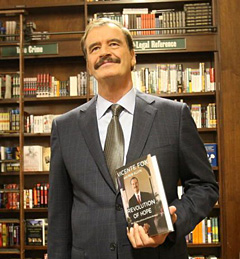 |
 |
 |
 Editorials | Opinions | October 2007 Editorials | Opinions | October 2007  
Revealing the Fox
 Paul D. Perry - Daily Light Paul D. Perry - Daily Light
go to original


| Revolution of Hope: The Life, Faith, and Dreams of a Mexican President
by Vicente Fox
(Viking Penguin, 2007, 375 pages)

Check it out at Amazon.com |
I remember the Cold War. During that time in Latin America, “revolution” usually meant some sort of attempt by dingy gangsters trying to appropriate property belonging to others. They acted more like bank robbers than politically minded “revolutionaries.”

A tiny minority of these self-styled reformers wished to share their stolen property with the poor, in the method of scraggly bearded Robin Hoods. Most of that crowd were mere bandits who had learned the language of the communist left, often with a little training in Havana or Moscow.

With all that in mind, I was a little concerned about the title that former President of Mexico Vicente Fox chose for his book, “Revolution of Hope: The Life, Faith, and Dreams of a Mexican President.”

Fox’s autobiography is co-written by Dallas-based political consultant Rob Allyn, and, as is typical when you get the spin doctors involved, this autobiography often gets a little too self-serving. More troubling than the spin, however, is the angle. Ironically, this autobiography’s first printing is available in English only. Obviously we in the United States are the target audience.

Vicente Fox is the grandson of an immigrant from Ohio who came to Mexico in the 1890s and a “half-French, half-Indian widow of an English aristocrat.” For those of us who live in the United States, this is the hook.

This book has the personal touches of an interesting biography and it is designed to reel in readers who vote in the United States, but it also contains a few barbs as well, especially for Texans. Santa Anna is referred to as a traitor but interestingly enough, we are taken to task for taking possession of what was largely the unsettled and lawless northwest of Mexico following the Mexican-American War.

The War and possession of those territories by the United States followed Mexico’s several attempts to reconquer Texas after Santa Anna had agreed to peace following his loss of Texas at the battle of San Jacinto. The Texas revolution was sparked by Santa Anna’s suspension of the Mexican Constitution, and Texas was one of several regions in old Mexico that rebelled against Santa Anna.

Texas was also not the only territory within Mexico to declare its political independence in reaction to Santa Anna’s tyranny, merely the only such area to maintain its independence — facts that former President Fox chooses to ignore.

I guess President Fox is holding a 160-year-old grudge. Yet, apparently, he wants us grudgees to open up our borders and our society to even more immigration from Mexico.

On the other hand, there is a very interesting and lively description of internal politics and doings in contemporary Mexico. It is in this section that Fox’s candor shines. His views of other world leaders are also valuable to anyone who wishes to enrich their understanding of the motivations of other world leaders beyond what our domestic press has to offer.

While he has referred to President Bush as being cocky, it becomes apparent that Fox himself is no stranger to pride. He is a veteran of rough and tumble politics and was a proven business leader before focusing his full attention on politics. Any open-minded reader will be impressed with his sense of duty to his people and his desire to influence affairs based upon his very open explanation of the way things ought to be and ought to work. Some of his pride can easily be forgiven by the reader.

While one should admire this man for risking everything to reform Mexico internally, I have some very real concerns about elements of his program for the Americas. In this case pride goeth before the proposal:

“Now that Mexico is a democracy, I believe that we could within our lifetimes ... we could build one great union of the Americas that one day might stretch from Canada to Chile,” he states. “This would not be a one world government but a strong American Common Market...”

Now we come to the meat of the matter. For all of its interesting sections, this is a book that continually proposes that the United States should serve as an escape valve for failed Mexican social policy. Fox’s bottom line is that the United States must always stand ready to absorb Mexican population.

While I might be willing to accept more immigration than the Pat Buchanans of the world, I do not think that the United States has the responsibility for serving as the overflow tank for an unlimited number of those born in Mexico. This is a continuing point in President Fox’s “biography,” and on this point Fox will prove an unsympathetic character to most of his targeted English-speaking audience in the United States.

To his credit, Fox did much to address what had been institutionalized corruption in Mexico and Mexican politics. He also helped to bring about a functional democracy or at least to heal an ailing one.

However, his view of a continental “common market” is primarily a vehicle for Mexico to shed that part of its population that cannot find employment in Mexico. That unemployment problem will best find its solution through continuing reform in Mexico. Perhaps President Fox should continue to focus his reforms on his own country and perhaps his biography/polemic should first have been available in Spanish. | 
 | |
 |



